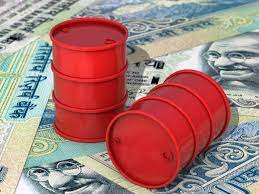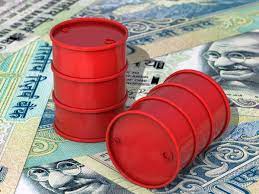
A rift is forming in India's refining sector, with private refiners tapping cheap Russian crude to improve export profits while domestically focused state refiners are constrained by high oil costs and government-capped domestic fuel prices.
While many Western consumers are shunning Russian crude as a result of its invasion of Ukraine, Indian private refiners such as Reliance and Nayara have been among the largest buyers of cheap Russian supply this year.
They are gaining significant profits by lowering domestic sales and aggressively increasing fuel exports, notably to buyers in Europe, which is currently boycotting Russian energy imports.
State refiners, on the other hand, are substantially smaller importers of Russian crude because they mostly buy oil under annual term supply contracts.
According to industry sources, they face potential losses in the June quarter as they deal with rising global oil costs and restricted retail fuel prices that have remained steady since early April to reign in runaway inflation.
According to Refinitiv Eikon data, India has purchased approximately 62.5 million barrels of Russian oil since Moscow's invasion of Ukraine on February 24, more than three times the amount purchased in the same period in 2021, with more than half going to private refiners Reliance Industries and Nayara Energy.
According to data firm Kpler, private refiners helped increase total Indian petroleum exports 15 per cent higher in the first five months of 2022 compared to the same period in 2021.
To accommodate dramatically increasing fuel exports, private refiners decreased their market share of domestic fuel sales to 7% in April from 10% in the fiscal year ending March 2022, according to an Indian state refinery source.
State refiners have had to increase domestic sales, but are losing more than 20 rupees per litre on diesel and 17 rupees per litre on gasoline, according to a second official at one of the state refiners.
Given such disparities in operational settings, brokerage ICICI Securities downgraded IOC, the country's largest state refiner and fuel retailer, to 'Hold' from 'Buy,' and suggested Reliance as an alternative stock suggestion.
"This is the golden age of refining margins for refiners. But in India state refiners' negative marketing margins are offsetting the gains from refining business," said Ehsan Ul Haq, an analyst with Refinitiv.
According to the state refining official, state refiners lose more than 200 rupees on each cylinder of cooking gas.
"The more we sell in the Indian market, the more we lose," said the second source.
Reliance, the operator of the world's largest refining plant in Jamnagar, western India, recently postponed refinery maintenance, purchased "arbitrage" barrels on the international crude oil market, and increased gasoline exports, the company announced last month.
"RIL remains well placed to benefit from the ongoing surge in refining margins given its high complexity, high diesel yield, and high export ratio," Citi said in a recent report.
According to various dealers from Reliance and Nayara Energy, private refiners have priced their fuels higher than their state counterparts and have curtailed supplies to their pumps, causing customers to turn to state merchants fuel stations.
"We are making refining margins of more than $30 per barrel by processing Russian oil and earning huge profits through exports of refined fuel," said an official at one of the private refiners.
In an emailed statement, Nayara Energy stated that it is maintaining gasoline supplies to its dealers and accepted a "minor" increase in retail pricing for the company's long-term interests.
(Source:www.dawn.com)
While many Western consumers are shunning Russian crude as a result of its invasion of Ukraine, Indian private refiners such as Reliance and Nayara have been among the largest buyers of cheap Russian supply this year.
They are gaining significant profits by lowering domestic sales and aggressively increasing fuel exports, notably to buyers in Europe, which is currently boycotting Russian energy imports.
State refiners, on the other hand, are substantially smaller importers of Russian crude because they mostly buy oil under annual term supply contracts.
According to industry sources, they face potential losses in the June quarter as they deal with rising global oil costs and restricted retail fuel prices that have remained steady since early April to reign in runaway inflation.
According to Refinitiv Eikon data, India has purchased approximately 62.5 million barrels of Russian oil since Moscow's invasion of Ukraine on February 24, more than three times the amount purchased in the same period in 2021, with more than half going to private refiners Reliance Industries and Nayara Energy.
According to data firm Kpler, private refiners helped increase total Indian petroleum exports 15 per cent higher in the first five months of 2022 compared to the same period in 2021.
To accommodate dramatically increasing fuel exports, private refiners decreased their market share of domestic fuel sales to 7% in April from 10% in the fiscal year ending March 2022, according to an Indian state refinery source.
State refiners have had to increase domestic sales, but are losing more than 20 rupees per litre on diesel and 17 rupees per litre on gasoline, according to a second official at one of the state refiners.
Given such disparities in operational settings, brokerage ICICI Securities downgraded IOC, the country's largest state refiner and fuel retailer, to 'Hold' from 'Buy,' and suggested Reliance as an alternative stock suggestion.
"This is the golden age of refining margins for refiners. But in India state refiners' negative marketing margins are offsetting the gains from refining business," said Ehsan Ul Haq, an analyst with Refinitiv.
According to the state refining official, state refiners lose more than 200 rupees on each cylinder of cooking gas.
"The more we sell in the Indian market, the more we lose," said the second source.
Reliance, the operator of the world's largest refining plant in Jamnagar, western India, recently postponed refinery maintenance, purchased "arbitrage" barrels on the international crude oil market, and increased gasoline exports, the company announced last month.
"RIL remains well placed to benefit from the ongoing surge in refining margins given its high complexity, high diesel yield, and high export ratio," Citi said in a recent report.
According to various dealers from Reliance and Nayara Energy, private refiners have priced their fuels higher than their state counterparts and have curtailed supplies to their pumps, causing customers to turn to state merchants fuel stations.
"We are making refining margins of more than $30 per barrel by processing Russian oil and earning huge profits through exports of refined fuel," said an official at one of the private refiners.
In an emailed statement, Nayara Energy stated that it is maintaining gasoline supplies to its dealers and accepted a "minor" increase in retail pricing for the company's long-term interests.
(Source:www.dawn.com)














